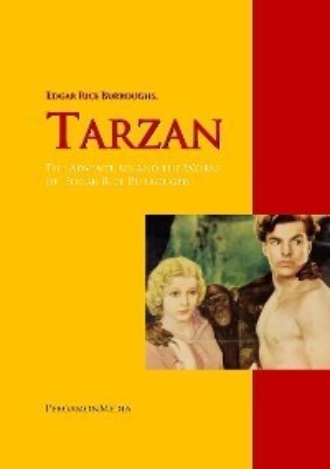
Полная версия
Tarzan: The Adventures and the Works of Edgar Rice Burroughs
"How did you happen to be in this village?" she asked.
He told her all that had transpired since the black had told him of Hanson's duplicity.
"You say that you are a coward," she said, "and yet you have done all this to save me? The courage that it must have taken to tell me the things that you told me but a moment since, while courage of a different sort, proves that you are no moral coward, and the other proves that you are not a physical coward. I could not love a coward."
"You mean that you love me?" he gasped in astonishment, taking a step toward her as though to gather her into his arms; but she placed her hand against him and pushed him gently away, as much as to say, not yet. What she did mean she scarcely knew. She thought that she loved him, of that there can be no question; nor did she think that love for this young Englishman was disloyalty to Korak, for her love for Korak was undiminished—the love of a sister for an indulgent brother. As they stood there for the moment of their conversation the sounds of tumult in the village subsided.
"They have killed him," whispered Meriem.
The statement brought Baynes to a realization of the cause of their return.
"Wait here," he said. "I will go and see. If he is dead we can do him no good. If he lives I will do my best to free him."
"We will go together," replied Meriem. "Come!" And she led the way back toward the tent in which they last had seen Korak. As they went they were often forced to throw themselves to the ground in the shadow of a tent or hut, for people were passing hurriedly to and fro now—the whole village was aroused and moving about. The return to the tent of Ali ben Kadin took much longer than had their swift flight to the palisade. Cautiously they crept to the slit that Korak's knife had made in the rear wall. Meriem peered within—the rear apartment was empty. She crawled through the aperture, Baynes at her heels, and then silently crossed the space to the rugs that partitioned the tent into two rooms. Parting the hangings Meriem looked into the front room. It, too, was deserted. She crossed to the door of the tent and looked out. Then she gave a little gasp of horror. Baynes at her shoulder looked past her to the sight that had startled her, and he, too, exclaimed; but his was an oath of anger.
A hundred feet away they saw Korak bound to a stake—the brush piled about him already alight. The Englishman pushed Meriem to one side and started to run for the doomed man. What he could do in the face of scores of hostile blacks and Arabs he did not stop to consider. At the same instant Tantor broke through the palisade and charged the group. In the face of the maddened beast the crowd turned and fled, carrying Baynes backward with them. In a moment it was all over, and the elephant had disappeared with his prize; but pandemonium reigned throughout the village. Men, women and children ran helter skelter for safety. Curs fled, yelping. The horses and camels and donkeys, terrorized by the trumpeting of the pachyderm, kicked and pulled at their tethers. A dozen or more broke loose, and it was the galloping of these past him that brought a sudden idea into Baynes' head. He turned to search for Meriem only to find her at his elbow.
"The horses!" he cried. "If we can get a couple of them!"
Filled with the idea Meriem led him to the far end of the village.
"Loosen two of them," she said, "and lead them back into the shadows behind those huts. I know where there are saddles. I will bring them and the bridles," and before he could stop her she was gone.
Baynes quickly untied two of the restive animals and led them to the point designated by Meriem. Here he waited impatiently for what seemed an hour; but was, in reality, but a few minutes. Then he saw the girl approaching beneath the burden of two saddles. Quickly they placed these upon the horses. They could see by the light of the torture fire that still burned that the blacks and Arabs were recovering from their panic. Men were running about gathering in the loose stock, and two or three were already leading their captives back to the end of the village where Meriem and Baynes were busy with the trappings of their mounts.
Now the girl flung herself into the saddle.
"Hurry!" she whispered. "We shall have to run for it. Ride through the gap that Tantor made," and as she saw Baynes swing his leg over the back of his horse, she shook the reins free over her mount's neck. With a lunge, the nervous beast leaped forward. The shortest path led straight through the center of the village, and this Meriem took. Baynes was close behind her, their horses running at full speed.
So sudden and impetuous was their dash for escape that it carried them half-way across the village before the surprised inhabitants were aware of what was happening. Then an Arab recognized them, and, with a cry of alarm, raised his rifle and fired. The shot was a signal for a volley, and amid the rattle of musketry Meriem and Baynes leaped their flying mounts through the breach in the palisade and were gone up the well-worn trail toward the north.
And Korak?
Tantor carried him deep into the jungle, nor paused until no sound from the distant village reached his keen ears. Then he laid his burden gently down. Korak struggled to free himself from his bonds, but even his great strength was unable to cope with the many strands of hard-knotted cord that bound him. While he lay there, working and resting by turns, the elephant stood guard above him, nor was there jungle enemy with the hardihood to tempt the sudden death that lay in that mighty bulk.
Dawn came, and still Korak was no nearer freedom than before. He commenced to believe that he should die there of thirst and starvation with plenty all about him, for he knew that Tantor could not unloose the knots that held him.
And while he struggled through the night with his bonds, Baynes and Meriem were riding rapidly northward along the river. The girl had assured Baynes that Korak was safe in the jungle with Tantor. It had not occurred to her that the ape-man might not be able to burst his bonds. Baynes had been wounded by a shot from the rifle of one of the Arabs, and the girl wanted to get him back to Bwana's home, where he could be properly cared for.
"Then," she said, "I shall get Bwana to come with me and search for Korak. He must come and live with us."
All night they rode, and the day was still young when they came suddenly upon a party hurrying southward. It was Bwana himself and his sleek, black warriors. At sight of Baynes the big Englishman's brows contracted in a scowl; but he waited to hear Meriem's story before giving vent to the long anger in his breast. When she had finished he seemed to have forgotten Baynes. His thoughts were occupied with another subject.
"You say that you found Korak?" he asked. "You really saw him?"
"Yes," replied Meriem; "as plainly as I see you, and I want you to come with me, Bwana, and help me find him again."
"Did you see him?" He turned toward the Hon. Morison.
"Yes, sir," replied Baynes; "very plainly."
"What sort of appearing man is he?" continued Bwana. "About how old, should you say?"
"I should say he was an Englishman, about my own age," replied Baynes; "though he might be older. He is remarkably muscled, and exceedingly tanned."
"His eyes and hair, did you notice them?" Bwana spoke rapidly, almost excitedly. It was Meriem who answered him.
"Korak's hair is black and his eyes are gray," she said.
Bwana turned to his headman.
"Take Miss Meriem and Mr. Baynes home," he said. "I am going into the jungle."
"Let me go with you, Bwana," cried Meriem. "You are going to search for Korak. Let me go, too."
Bwana turned sadly but firmly upon the girl.
"Your place," he said, "is beside the man you love."
Then he motioned to his head-man to take his horse and commence the return journey to the farm. Meriem slowly mounted the tired Arab that had brought her from the village of The Sheik. A litter was rigged for the now feverish Baynes, and the little cavalcade was soon slowly winding off along the river trail.
Bwana stood watching them until they were out of sight. Not once had Meriem turned her eyes backward. She rode with bowed head and drooping shoulders. Bwana sighed. He loved the little Arab girl as he might have loved an own daughter. He realized that Baynes had redeemed himself, and so he could interpose no objections now if Meriem really loved the man; but, somehow, some way, Bwana could not convince himself that the Hon. Morison was worthy of his little Meriem. Slowly he turned toward a nearby tree. Leaping upward he caught a lower branch and drew himself up among the branches. His movements were cat-like and agile. High into the trees he made his way and there commenced to divest himself of his clothing. From the game bag slung across one shoulder he drew a long strip of doe-skin, a neatly coiled rope, and a wicked looking knife. The doe-skin, he fashioned into a loin cloth, the rope he looped over one shoulder, and the knife he thrust into the belt formed by his gee string.
When he stood erect, his head thrown back and his great chest expanded a grim smile touched his lips for a moment. His nostrils dilated as he sniffed the jungle odors. His gray eyes narrowed. He crouched and leaped to a lower limb and was away through the trees toward the southeast, bearing away from the river. He moved swiftly, stopping only occasionally to raise his voice in a weird and piercing scream, and to listen for a moment after for a reply.
He had traveled thus for several hours when, ahead of him and a little to his left, he heard, far off in the jungle, a faint response—the cry of a bull ape answering his cry. His nerves tingled and his eyes lighted as the sound fell upon his ears. Again he voiced his hideous call, and sped forward in the new direction.
Korak, finally becoming convinced that he must die if he remained where he was, waiting for the succor that could not come, spoke to Tantor in the strange tongue that the great beast understood. He commanded the elephant to lift him and carry him toward the northeast. There, recently, Korak had seen both white men and black. If he could come upon one of the latter it would be a simple matter to command Tantor to capture the fellow, and then Korak could get him to release him from the stake. It was worth trying at least—better than lying there in the jungle until he died. As Tantor bore him along through the forest Korak called aloud now and then in the hope of attracting Akut's band of anthropoids, whose wanderings often brought them into their neighborhood. Akut, he thought, might possibly be able to negotiate the knots—he had done so upon that other occasion when the Russian had bound Korak years before; and Akut, to the south of him, heard his calls faintly, and came. There was another who heard them, too.
After Bwana had left his party, sending them back toward the farm, Meriem had ridden for a short distance with bowed head. What thoughts passed through that active brain who may say? Presently she seemed to come to a decision. She called the headman to her side.
"I am going back with Bwana," she announced.
The black shook his head. "No!" he announced. "Bwana says I take you home. So I take you home."
"You refuse to let me go?" asked the girl.
The black nodded, and fell to the rear where he might better watch her. Meriem half smiled. Presently her horse passed beneath a low-hanging branch, and the black headman found himself gazing at the girl's empty saddle. He ran forward to the tree into which she had disappeared. He could see nothing of her. He called; but there was no response, unless it might have been a low, taunting laugh far to the right. He sent his men into the jungle to search for her; but they came back empty handed. After a while he resumed his march toward the farm, for Baynes, by this time, was delirious with fever.
Meriem raced straight back toward the point she imagined Tantor would make for—a point where she knew the elephants often gathered deep in the forest due east of The Sheik's village. She moved silently and swiftly. From her mind she had expunged all thoughts other than that she must reach Korak and bring him back with her. It was her place to do that. Then, too, had come the tantalizing fear that all might not be well with him. She upbraided herself for not thinking of that before—of letting her desire to get the wounded Morison back to the bungalow blind her to the possibilities of Korak's need for her. She had been traveling rapidly for several hours without rest when she heard ahead of her the familiar cry of a great ape calling to his kind.
She did not reply, only increased her speed until she almost flew. Now there came to her sensitive nostrils the scent of Tantor and she knew that she was on the right trail and close to him she sought. She did not call out because she wished to surprise him, and presently she did, breaking into sight of them as the great elephant shuffled ahead balancing the man and the heavy stake upon his head, holding them there with his upcurled trunk.
"Korak!" cried Meriem from the foliage above him.
Instantly the bull swung about, lowered his burden to the ground and, trumpeting savagely, prepared to defend his comrade. The ape-man, recognizing the girl's voice, felt a sudden lump in his throat.
"Meriem!" he called back to her.
Happily the girl clambered to the ground and ran forward to release Korak; but Tantor lowered his head ominously and trumpeted a warning.
"Go back! Go back!" cried Korak. "He will kill you."
Meriem paused. "Tantor!" she called to the huge brute. "Don't you remember me? I am little Meriem. I used to ride on your broad back;" but the bull only rumbled in his throat and shook his tusks in angry defiance. Then Korak tried to placate him. Tried to order him away, that the girl might approach and release him; but Tantor would not go. He saw in every human being other than Korak an enemy. He thought the girl bent upon harming his friend and he would take no chances. For an hour the girl and the man tried to find some means whereby they might circumvent the beast's ill directed guardianship, but all to no avail; Tantor stood his ground in grim determination to let no one approach Korak.
Presently the man hit upon a scheme. "Pretend to go away," he called to the girl. "Keep down wind from us so that Tantor won't get your scent, then follow us. After a while I'll have him put me down, and find some pretext for sending him away. While he is gone you can slip up and cut my bonds—have you a knife?"
"Yes, I have a knife," she replied. "I'll go now—I think we may be able to fool him; but don't be too sure—Tantor invented cunning."
Korak smiled, for he knew that the girl was right. Presently she had disappeared. The elephant listened, and raised his trunk to catch her scent. Korak commanded him to raise him to his head once more and proceed upon their way. After a moment's hesitation he did as he was bid. It was then that Korak heard the distant call of an ape.
"Akut!" he thought. "Good! Tantor knew Akut well. He would let him approach." Raising his voice Korak replied to the call of the ape; but he let Tantor move off with him through the jungle; it would do no harm to try the other plan. They had come to a clearing and plainly Korak smelled water. Here was a good place and a good excuse. He ordered Tantor to lay him down, and go and fetch him water in his trunk. The big beast deposited him upon the grass in the center of the clearing, then he stood with cocked ears and attentive trunk, searching for the slightest indication of danger—there seemed to be none and he moved away in the direction of the little brook that Korak knew was some two or three hundred yards away. The ape-man could scarce help smiling as he thought how cleverly he had tricked his friend; but well as he knew Tantor he little guessed the guile of his cunning brain. The animal ambled off across the clearing and disappeared in the jungle beyond in the direction of the stream; but scarce had his great bulk been screened by the dense foliage than he wheeled about and came cautiously back to the edge of the clearing where he could see without being seen. Tantor, by nature, is suspicious. Now he still feared the return of the she Tarmangani who had attempted to attack his Korak. He would just stand there for a moment and assure himself that all was well before he continued on toward the water. Ah! It was well that he did! There she was now dropping from the branches of a tree across the clearing and running swiftly toward the ape-man. Tantor waited. He would let her reach Korak before he charged—that would ensure that she had no chance of escape. His little eyes blazed savagely. His tail was elevated stiffly. He could scarce restrain a desire to trumpet forth his rage to the world. Meriem was almost at Korak's side when Tantor saw the long knife in her hand, and then he broke forth from the jungle, bellowing horribly, and charged down upon the frail girl.
Chapter 27
Korak screamed commands to his huge protector, in an effort to halt him; but all to no avail. Meriem raced toward the bordering trees with all the speed that lay in her swift, little feet; but Tantor, for all his huge bulk, drove down upon her with the rapidity of an express train.
Korak lay where he could see the whole frightful tragedy. The cold sweat broke out upon his body. His heart seemed to have stopped its beating. Meriem might reach the trees before Tantor overtook her, but even her agility would not carry her beyond the reach of that relentless trunk—she would be dragged down and tossed. Korak could picture the whole frightful scene. Then Tantor would follow her up, goring the frail, little body with his relentless tusks, or trampling it into an unrecognizable mass beneath his ponderous feet.
He was almost upon her now. Korak wanted to close his eyes, but could not. His throat was dry and parched. Never in all his savage existence had he suffered such blighting terror—never before had he known what terror meant. A dozen more strides and the brute would seize her. What was that? Korak's eyes started from their sockets. A strange figure had leaped from the tree the shade of which Meriem already had reached—leaped beyond the girl straight into the path of the charging elephant. It was a naked white giant. Across his shoulder a coil of rope was looped. In the band of his gee string was a hunting knife. Otherwise he was unarmed. With naked hands he faced the maddening Tantor. A sharp command broke from the stranger's lips—the great beast halted in his tracks—and Meriem swung herself upward into the tree to safety. Korak breathed a sigh of relief not unmixed with wonder. He fastened his eyes upon the face of Meriem's deliverer and as recognition slowly filtered into his understanding they went wide in incredulity and surprise.
Tantor, still rumbling angrily, stood swaying to and fro close before the giant white man. Then the latter stepped straight beneath the upraised trunk and spoke a low word of command. The great beast ceased his muttering. The savage light died from his eyes, and as the stranger stepped forward toward Korak, Tantor trailed docilely at his heels.
Meriem was watching, too, and wondering. Suddenly the man turned toward her as though recollecting her presence after a moment of forgetfulness. "Come! Meriem," he called, and then she recognized him with a startled: "Bwana!" Quickly the girl dropped from the tree and ran to his side. Tantor cocked a questioning eye at the white giant, but receiving a warning word let Meriem approach. Together the two walked to where Korak lay, his eyes wide with wonder and filled with a pathetic appeal for forgiveness, and, mayhap, a glad thankfulness for the miracle that had brought these two of all others to his side.
"Jack!" cried the white giant, kneeling at the ape-man's side.
"Father!" came chokingly from The Killer's lips. "Thank God that it was you. No one else in all the jungle could have stopped Tantor."
Quickly the man cut the bonds that held Korak, and as the youth leaped to his feet and threw his arms about his father, the older man turned toward Meriem.
"I thought," he said, sternly, "that I told you to return to the farm."
Korak was looking at them wonderingly. In his heart was a great yearning to take the girl in his arms; but in time he remembered the other—the dapper young English gentleman—and that he was but a savage, uncouth ape-man.
Meriem looked up pleadingly into Bwana's eyes.
"You told me," she said, in a very small voice, "that my place was beside the man I loved," and she turned her eyes toward Korak all filled with the wonderful light that no other man had yet seen in them, and that none other ever would.
The Killer started toward her with outstretched arms; but suddenly he fell upon one knee before her, instead, and lifting her hand to his lips kissed it more reverently than he could have kissed the hand of his country's queen.
A rumble from Tantor brought the three, all jungle bred, to instant alertness. Tantor was looking toward the trees behind them, and as their eyes followed his gaze the head and shoulders of a great ape appeared amidst the foliage. For a moment the creature eyed them, and then from its throat rose a loud scream of recognition and of joy, and a moment later the beast had leaped to the ground, followed by a score of bulls like himself, and was waddling toward them, shouting in the primordial tongue of the anthropoid:
"Tarzan has returned! Tarzan, Lord of the Jungle!"
It was Akut, and instantly he commenced leaping and bounding about the trio, uttering hideous shrieks and mouthings that to any other human beings might have indicated the most ferocious rage; but these three knew that the king of the apes was doing homage to a king greater than himself. In his wake leaped his shaggy bulls, vying with one another as to which could spring the highest and which utter the most uncanny sounds.
Korak laid his hand affectionately upon his father's shoulder.
"There is but one Tarzan," he said. "There can never be another."
Two days later the three dropped from the trees on the edge of the plain across which they could see the smoke rising from the bungalow and the cook house chimneys. Tarzan of the Apes had regained his civilized clothing from the tree where he had hidden it, and as Korak refused to enter the presence of his mother in the savage half-raiment that he had worn so long and as Meriem would not leave him, for fear, as she explained, that he would change his mind and run off into the jungle again, the father went on ahead to the bungalow for horses and clothes.
My Dear met him at the gate, her eyes filled with questioning and sorrow, for she saw that Meriem was not with him.
"Where is she?" she asked, her voice trembling. "Muviri told me that she disobeyed your instructions and ran off into the jungle after you had left them. Oh, John, I cannot bear to lose her, too!" And Lady Greystoke broke down and wept, as she pillowed her head upon the broad breast where so often before she had found comfort in the great tragedies of her life.
Lord Greystoke raised her head and looked down into her eyes, his own smiling and filled with the light of happiness.
"What is it, John?" she cried. "You have good news—do not keep me waiting for it."
"I want to be quite sure that you can stand hearing the best news that ever came to either of us," he said.
"Joy never kills," she cried. "You have found—her?" She could not bring herself to hope for the impossible.
"Yes, Jane," he said, and his voice was husky with emotion; "I have found her, and—HIM!"
"Where is he? Where are they?" she demanded.
"Out there at the edge of the jungle. He wouldn't come to you in his savage leopard skin and his nakedness—he sent me to fetch him civilized clothing."
She clapped her hands in ecstasy, and turned to run toward the bungalow. "Wait!" she cried over her shoulder. "I have all his little suits—I have saved them all. I will bring one to you."
Tarzan laughed and called to her to stop.
"The only clothing on the place that will fit him," he said, "is mine—if it isn't too small for him—your little boy has grown, Jane."
She laughed, too; she felt like laughing at everything, or at nothing. The world was all love and happiness and joy once more—the world that had been shrouded in the gloom of her great sorrow for so many years. So great was her joy that for the moment she forgot the sad message that awaited Meriem. She called to Tarzan after he had ridden away to prepare her for it, but he did not hear and rode on without knowing himself what the event was to which his wife referred.






